| Week 1: Overview of Thoreau's Life & Legacy Required Readings:Elizabeth Witherell, "The Life and Times of Henry David Thoreau," Writings of Henry David Thoreau, University of California at Santa Barbara. Ralph Waldo Emerson, "Thoreau," Atlantic Monthly (August 1862). About Thoreau, Thoreau Society Mapping Thoreau Country: Concord, Massachusetts (browse links). Bradley Dean, A Thoreau Chronology, Thoreau Reader. Background Walter Harding, The Days of Henry David Thoreau (various editions). Thoreau Reader (browse links). | 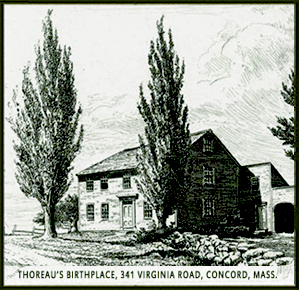 |
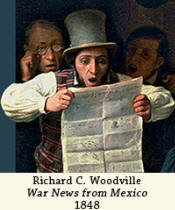
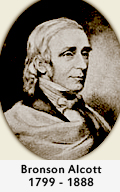 | Week 2: Resistance to Civil Government Required Readings:"A Concise History of the U.S. Mexican War," Descendants of U.S. Mexican War Veterans. Douglas Harper, "Slavery in Massachusetts," Slavery in the North. Henry David Thoreau, "Resistance to Civil Government: A lecture delivered in 1847," The Aesthetic Papers, edited by Elizabeth Palmer Peabody (Boston:1849). 1st alternative link: "Civil Disobedience," The Thoreau Reader; 2nd alternative link, "Resistance to Civil Government," Reading New England. Background Robert Gross, "Quiet War with the State: Henry David Thoreau and Civil Disobedience," Yale Review 91 (October 2005): 1-17. Michael J. Frederick, "Transcendental Ethos: Thoreau’s Philosophy & Antebellum Reform," Thoreau Reader. Mapping Thoreau Country, Concord Jail. | 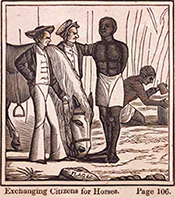
Picture of Slavery, 1834
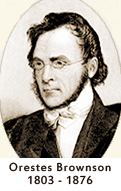
| Assignments for Weeks 1 & 2 (combined) | 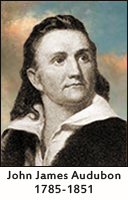 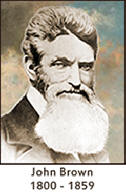 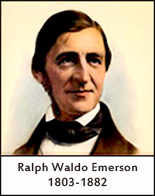 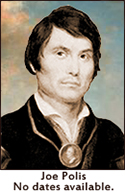 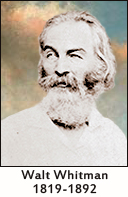 | Week 3: Walden Required Readings:Henry David Thoreau, Walden, Chapter I and Chapter II. Henry David Thoreau, Walden, Conclusion Alternative link: Walden, Chapter 1, "Economy;" Chapter 2, "Where I Lived and What I Lived For, Conclusion, Thoreau Reader. Philip Cafaro, "Thoreau's Environmental Ethics in Walden," The Concord Saunterer: A Journal of Thoreau Studies (2002) 10: 17-63. Mapping Thoreau Country, Walden Pond. Assignment for Week 3 | 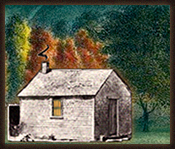
Become a Friend of Walden Pond. | |

| Week 4: The Natural and Unnatural History of Massachusetts Required Readings:Henry David Thoreau, "The Natural History of Massachusetts," 1842. Henry David Thoreau, "Slavery in Massachusetts," 1863. (Speech delivered in 1854.) Henry David Thoreau, "Life Without Principle," 1863. (Lecture delivered in 1854.) Wen Stephenson, "The New Abolitionists," Phoenix Magazine, February 12, 2013. Background Sandra Harbert Petrulionis, "Thoreau Transforms His Journal into “Slavery in Massachusetts,” Thoreau Reader. Mapping Thoreau Country: Framingham and Lowell Assignment for Week 4 |  | Week 5: An Overview of Thoreau's Historical Influence: Anarchism, Pacifism, and Civil Rights | Emma Goldman, "Anarchism, What It Really Stands For," Anarchism and Other Essays (1911). Martin Luther King, "Letter from Birmingham Jail" (1963), University of Pennsylvania. |  | During my student days I read Henry David Thoreau's essay On Civil Disobedience for the first time. Here, in this courageous New Englander's refusal to pay his taxes and his choice of jail rather than support a war that would spread slavery's territory into Mexico, I made my first contact with the theory of nonviolent resistance. Fascinated by the idea of refusing to cooperate with an evil system, I was so deeply moved that I reread the work several times. I became convinced that noncooperation with evil is as much a moral obligation as is cooperation with good. No other person has been more eloquent and passionate in getting this idea across than Henry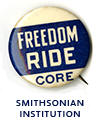 David Thoreau. As a result of his writings and personal witness, we are the heirs of a legacy of creative protest. The teachings of Thoreau came alive in our civil rights movement; indeed, they are more alive than ever before. Whether expressed in a sit-in at lunch counters, a freedom ride into Mississippi, a peaceful protest in Albany, Georgia, a bus boycott in Montgomery, Alabama, these are outgrowths of Thoreau's insistence that evil must be resisted and that no moral man can patiently adjust to injustice. —The Autobiography of Martin Luther King, Jr.[19] David Thoreau. As a result of his writings and personal witness, we are the heirs of a legacy of creative protest. The teachings of Thoreau came alive in our civil rights movement; indeed, they are more alive than ever before. Whether expressed in a sit-in at lunch counters, a freedom ride into Mississippi, a peaceful protest in Albany, Georgia, a bus boycott in Montgomery, Alabama, these are outgrowths of Thoreau's insistence that evil must be resisted and that no moral man can patiently adjust to injustice. —The Autobiography of Martin Luther King, Jr.[19] |
| "Civil Disobedience," Stanford Encyclopedia of Philosophy.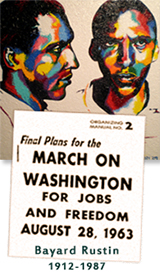 George Hendrick, "The Influence of Thoreau's "Civil Disobedience" on Gandhi's Satyagraha," The New England Quarterly, Vol. 29, No. 4 (Dec., 1956), 462-471. George E. Carter, Martin Luther King: Incipient Transcendentalist, Phylon, Vol. 40, No. 4 (1979), 318-324; http://www.jstor.org/stable/274528. Background African-American Odyssey: The Civil Rights Era, Part One: Sit-Ins, Freedom Rides, and Demonstrations, Library of Congress. Freedom Singers, "Fighting For My Rights," Newport Broadside, 1963 (Vanguard Records, 1991). Susan E. Gallagher, Rage Against the Machine: Echoes of Thoreau in the 1960's, web resource. Mapping Thoreau Country, Concord Jail. Assignment for Week 6 | | Weeks 7 - 8: Thoreau's Influence in Environmental Politics and Policy | |
The Evolution of the Conservation Movement, 1850-1920
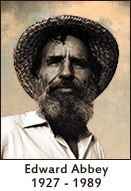
|
Henry David Thoreau, "Walking, or the Wild," Thoreau Reader. (Lecture delivered in 1851.) "
John Muir: A Brief Biography," Sierra Club.
John Muir, "American Forests," Our National Parks (1901)."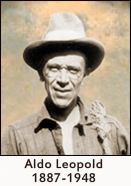
The Leopold Legacy," Aldo Leopold Foundation
Aldo Leopold, Excerpts from A Sand County Almanac, originally published in 1949, Ithaca College.
David Rains Wallace, "The Earth Was Here First," review of A Sand County Almanac, by Aldo Leopold, New York Times Book Review, February 28, 1988.
Edward Abbey's "Poison Pen," Audubon Magazine (Letters to editors).
E.O. Wilson," A Letter to Thoreau," prologue, The Future of Life (2003).
Bill McKibben, "American Earth: Environmental Writing Since Thoreau," webcast (April 2008).
Naomi Klein, "Capitalism vs. the Climate," The Nation, November 28, 2011.
Wen Stephenson, "Why I'm Walking to Walden," Guardian UK.
Background
Fitchburg, Mapping Thoreau Country
Bedford, Mapping Thoreau Country
The Conservation Movement, 1850-1920, Wisconsin Historical Society.
Walden Climate-Change Collaborative Presentation Assignment for Week 7 Assignment for Week 8 |
| |  Weeks 9-13: Presentations & Papers Weeks 9-13: Presentations & Papers
Assignment for Week 9
|
|
|